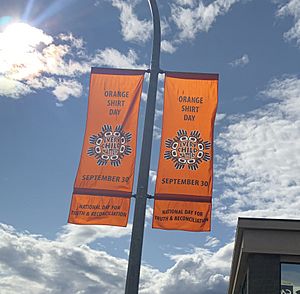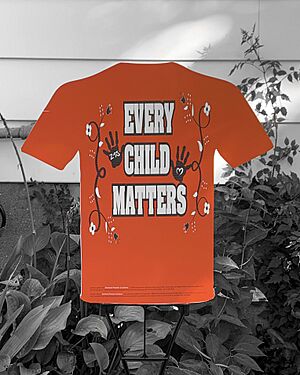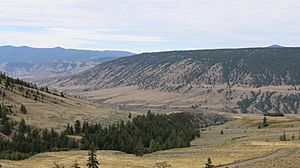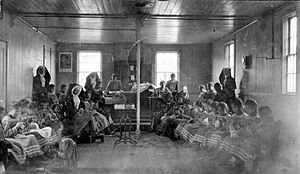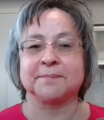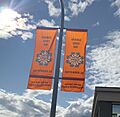Phyllis Webstad facts for kids
Quick facts for kids
Phyllis Webstad
|
|
|---|---|
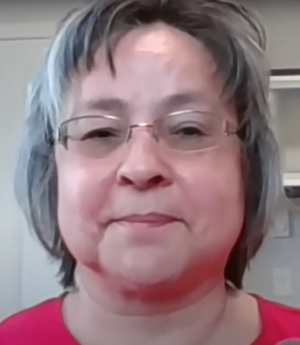
Webstad in May 2022
|
|
| Born | Phyllis Jack July 13, 1967 Dog Creek, Cariboo Regional District, British Columbia, Canada |
| Occupation |
|
| Nationality | Canadian |
| Education | Doctorate of Law (honorary) |
| Genre | Historical |
| Subject | Canadian Indian residential school system |
| Years active | 2018 to present |
| Notable works |
|
| Notable awards |
|
Phyllis Webstad (born July 13, 1967) is a Northern Secwepemc author and activist. She is from the Stswecem'c Xgat'tem First Nation in British Columbia, Canada. Phyllis is famous for creating Orange Shirt Day. This day is a time for people in Canada to remember the history of residential schools.
Phyllis Webstad is a survivor of the residential school system. She has written several books about her experiences. One of her books is a picture book that helps explain what residential schools were like.
Contents
Orange Shirt Day: A Day of Remembrance
Orange Shirt Day started because of Phyllis Webstad's story. She shared her experience in April 2013 at an event in Williams Lake, British Columbia. This event was about the St. Joseph Mission (SJM) Residential School.
Phyllis was six years old when she first went to residential school. On her first day, her new orange shirt was taken from her. She never got it back. This orange shirt now stands for how residential schools tried to make Indigenous children forget their culture.
Orange Shirt Day happens every year on September 30. It is a national day of remembrance in Canada. People are encouraged to wear an orange shirt on this day. In 2021, the Canadian government made it a public holiday for federal workers. It is now called the National Day for Truth and Reconciliation.
September 30 was chosen because it was the time of year when Indigenous children were taken from their homes. The main message of the day is "Every Child Matters."
On Orange Shirt Day, Canadians are asked to learn about residential schools. They learn how these schools tried to change Indigenous children's identities. Many communities hold special walks, show films, and give talks. These events help people understand Indigenous history. Schools in Canada also use this day to teach students about the residential school system.
Phyllis Webstad's Work and Activism
Phyllis Webstad began sharing her story in April 2013. This was at the St. Joseph's Mission Residential School event. It was the first time she had spoken publicly about her residential school experience. This included the story of her orange shirt.
After this event, Phyllis's story became well-known online. This led to the creation of Orange Shirt Day. The day helps teach people about the effects of residential schools. It also honors the experiences of Indigenous children.
Phyllis is the leader of the Orange Shirt Society. This is a non-profit group she started. The society helps with events that support reconciliation. It also raises awareness about the residential school system's impacts. The Orange Shirt Society teaches about respect and community. Phyllis often gives talks and leads workshops.
Phyllis's son leads the Orange Jersey Project. This project is part of the Orange Shirt Society. It works with the Western Hockey League. The goal is to teach young people about Indigenous history through sports. It also teaches them about reconciliation.
Phyllis was featured in a 2021 documentary film called Returning Home.
Awards and Recognition
Phyllis Webstad has received several important awards. In 2017, Thompson Rivers University gave her the Community Impact Award. They also recognized her as a distinguished alumni.
In September 2021, her book "Beyond The Orange Shirt Story" won an award. It received the First Nation Communities Read Award for best Indigenous literature.
In December 2021, she won the 2021 Doris Anderson Woman of the Year award.
In January 2022, Phyllis was given the Governor General's Meritorious Service Cross. This award honors Canadians who have done amazing things for Canada.
Education Journey
In the early 2000s, Phyllis Webstad studied at the Nicola Valley Institute of Technology (NVIT). This school is in Merritt, British Columbia. NVIT is an Indigenous public college in British Columbia. It offers programs for Indigenous students and communities. Phyllis earned a diploma in business administration from NVIT.
She then continued her studies at Thompson Rivers University (TRU). This university is in Kamloops, British Columbia. At TRU, she earned a diploma in accounting.
On October 6, 2023, Simon Fraser University (SFU) gave Phyllis an honorary Doctorate of Laws degree. This special degree was given during SFU's fall graduation ceremony.
Personal Life and Early Experiences
Early Life and Family
Phyllis Webstad was born on July 13, 1967. She was born on the Dog Creek Reserve in British Columbia. This reserve is about 85 kilometers south of Williams Lake.
Phyllis was mostly raised by her grandmother until she was ten. Their home did not have electricity or running water. Despite this, Phyllis remembers a childhood full of traditional ways. Her family lived off the land. They had three gardens and stored food in a cellar. Phyllis helped catch sockeye salmon at night along the Fraser River. They would prepare the fish for drying the next morning. Berry picking was also a common activity. In the summers, Phyllis and her cousin would camp with her grandmother along the Fraser River.
Phyllis's family has a long history with the residential school system. Her mother and father were not around much when she was young. This made her feel abandoned. Her grandmother was her main caregiver. She taught Phyllis traditional ways of living. Phyllis's great-grandmother, born in 1880, believed residential schools would help her family. Both Phyllis's mother and grandmother attended St. Joseph's Mission Residential School for ten years each.
On September 30, 1973, when Phyllis was six, she was sent to St. Joseph's Mission Residential School. This school was near Williams Lake. Before she left, her grandmother bought her new clothes. Phyllis chose a bright orange shirt. This shirt made her excited about school. But on her first day, the school took her clothes, including the orange shirt. She never saw it again. This difficult experience later inspired Orange Shirt Day.
Phyllis stayed at St. Joseph's Mission for one year. She went to a different school in Williams Lake for classes during the day. She returned to the residential school at night. She had very little contact with her family. This was common in the residential school system. The system tried to make Indigenous children forget their native languages and cultures.
The next year, a school opened on the Dog Creek Reserve. This allowed Phyllis to go home and live with her grandmother. Her experiences at the residential school later influenced her work in reconciliation.
Phyllis had her son when she was 14 years old.
Adulthood and Family Life
Phyllis Webstad is married and lives in Williams Lake. She has one biological son and a step-son. She is also a grandmother to five grandchildren.
Phyllis has shared that her grandchildren are the first in her family to grow up with both parents. Her oldest grandson became a paramedic, which she has proudly mentioned.
Phyllis has spoken about her journey of healing. She continues to support mental health and well-being. This is important for herself and for other residential school survivors.
Images for kids
 | Laphonza Butler |
 | Daisy Bates |
 | Elizabeth Piper Ensley |


